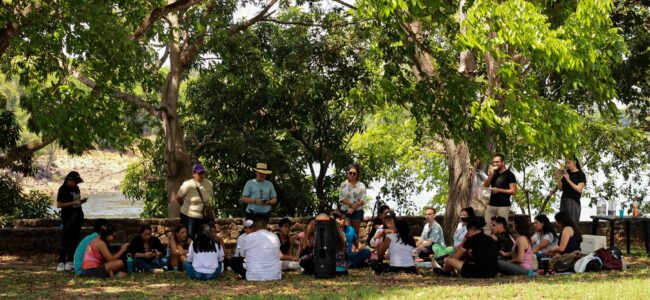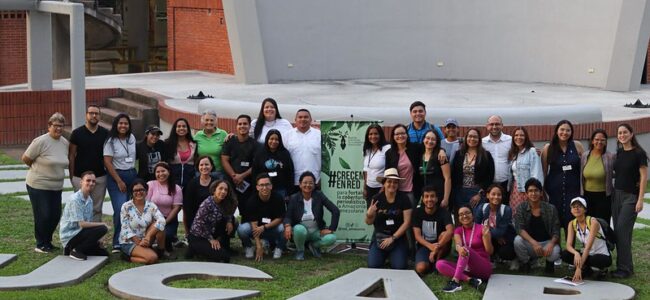Censorship cases, news deserts, threats from criminal groups, disinformation spread by the government, financial problems: theose are some of the many challenges facing those who insist on doing independent journalism in Venezuela, as dozens of articles published over the years by LatAam Journalism Review (LJR) show.
If the situation in the capital, Caracas, is already precarious, the problems intensify as you move away from the center of the country's political and economic power towards areas where less money circulates and infrastructure is more limited. This is the case in the states of Amazonas, Bolívar and Delta Amacuro, the three southern states where the Venezuelan Amazon is located, said journalist María de los Ángeles Ramírez, who is from Guayana, the most populated city in Bolívar state.
"If in Caracas we already face limitations to practicing journalism, when you move to the south of the country, those limitations become much deeper. This is due not only to a scarcity of resources, but also to high costs of covering everything related to the Amazon," Ramírez Cabello, who lives in Puerto Ordaz, told LJR. "We are talking about a territory that represents practically half of Venezuela. In terms of travel logistics, for example, everything becomes much more complicated. Threats are also a factor to take into consideration."
In order to tackle these and other challenges by joining forces, distributing resources and forming a common front for cooperation, Ramírez and fellow journalists Clavel Rangel and Laura Clisánchez founded the Network of Journalists in the Venezuelan Amazon last year. The idea for the network was born out of the need to address problems such as economic difficulties, as well as legal and criminal threats in the region.
The initiative aims to promote training, sharing of experiences and collaboration among journalists of the Venezuelan Amazon, ranging from jointly produced feature stories to specific courses tailored for the region. The three journalists wanted to create a mechanism to obtain funding, to support and train journalists, and to collaborate to cover the region more comprehensively. The network just held its first face-to-face meeting on Oct. 13 and 14, following a virtual event last year and several collaborative feature stories.

Journalists participate in an outdoor activity during the inaugural in-person gathering of the Network of Journalists in the Venezuelan Amazon. (Photo: Vero Urdaneta/Amazon Venezuelan Journalists Network)
The trio's first collaboration, alongside several other journalists, was the 2019 series of stories Fosas del silencio [Silenced graves]. Carried out over two years and financed by the Resilience Fund of the anti-organized crime organization Global Initiative, the feature stories investigated cases of missing people in Venezuelan mines.
Before that, the three journalists had worked at Correo del Caroní, the largest newspaper in the region. According to Clavel Rangel, the newspaper's newsroom usually functionshas functioned as a second training school for journalists graduating from the Andrés Bello Catholic University in Ciudad Guayana (UCAB Guayana). for years. However, this is changing.
"Correo del Caroní has been an example of coverage in various parts of the Bolívar state, especially on the border [with Brazil]. Our experience at Correo was that we studied at the university and then worked in a newsroom to train ourselves, but that has changed due to the economic and legal suffocation imposed by the government against independent media," Rangel told LJR. "Due to the crisis, not only the Correo, but also other media, have cut their correspondents, and many journalists were forced to emigrate. This eroded coverage of the Amazon and the training of journalists in the region."
The idea for the network came from the desire to do something long-term. Ramírez and Rangel, both now 38, were aware that the market in the region was changing rapidly and they needed to adapt. Based on this realization, they invited Clisánchez, a data journalism specialist 12 years their junior, to join them and create a joint initiative to support local journalism.
At the end of 2021, the trio produced the first product on behalf of the network: a study carried out with 35 journalists from the Venezuelan Amazon, with a diagnosis of the situation experienced by journalists in the region.
“In the south of Venezuela, the practice of journalism is carried out in a hostile context due to the presence of armed groups that divide up the territory amongst themselves with practically no State resistance. The research showed that 60% of the participants have received threats or aggressions during their professional practice," according to the study.
"Other factors that prevent them from reporting are lack of motivation due to low salaries; lack of equipment; problems with internet connection; self-censorship in the media; and lack of access to public information," the study concluded.
According to Rangel, the survey offered "a small overview" of the needs of local media professionals. One of them stood out: the need for editorial support. As news outlets have weakened, many journalists have become freelancers, thus no longer having editors.
"Many are working as freelancers and that has its advantages, but the disadvantage is that you are unprotected. Because in the end you answer for yourself,” Rangel said, who is herself an independent journalist.
With this diagnosis, the network's founders went in search of financial support and found three organizations to back them – of these, only Global Initiative agreed to reveal its identitfy, as the others feared retaliation. The journalists then began to offer editorial support for in-depth stories, managing to edit a first batch of four stories, published in Correo del Caroní and El Pitazo.
In May, two long profiles of Indigenous leaders from the state of Amazonas were published by Madelen Rocio Simó Sulbarán. Also that month, there was a story by Morelia Morillo on flooding in the border town of Santa Elena de Uairén. In July, Clisánchez published an article on the traditional cultivation of cacao in Bolívar. In October, a joint byline story on the use of mercury in mining appeared. Several of these stories, such as the one on mercury, are in conflict with powerful interests.
"It’s hostile territory, with a very violent climate and where many topics are subject to censorship. We, the journalists here, face threats from companies, criminal groups, as well as from the State," Clisánchez said.
Clisánchez herself, who lives in Ciudad Guayana, has suffered from intimidation. Between March and June of this year, after publishing stories in Correo del Caroní about public contracts allegedly won irregularly by a local company, false anonymous accusations against her began to emerge on the Internet, she told LJR. For the real purpose of defaming her, false accounts created under her name attempted to sell stories.
This was not the only persecution suffered by one of the network's founders. In 2020, after publishing an article on the Armando.info website, Rangel was the target of a lawsuit, which called for her to be banned from leaving the country. The journalist acted swiftly and moved to Miami, where she has lived for the past three years.
Despite this challenging context, many journalists remain in the Venezuelan Amazon. Forty-three journalists from five Venezuelan states met on Oct. 13 and 14 in Ciudad Guayana for the first face-to-face conference of the Venezuelan Amazon Journalists Network. The conference, which included various talks and workshops, took place at UCAB Guayana, the alma mater of the three founders of the network, where María Ramírez teaches and Rangel Clavel was also a professor.
The conference had been planned since the pandemic, and took place after a similar virtual initiative last year. In addition to the conference, the journalists are currently scrambling for funds and preparing a second series of stories, to be published in the near future. Mid-term, initially there are no plans to set up a news outlet. Instead, the network's team plans to help local news outlets by funding stories and offering support.
At the face-to-face conference, one of the speakers, Helena Carpio, a Prodavinci journalist and Pulitzer Center fellow, gave a speech highlighting the role of collaboration in the region, according to a Runrun.es report.
"I think we’re used to thinking about journalism too much in individual terms," Carpio said. “Collaboration is fundamental and I believe that until we take that step as a guild, we’re not going to overcome those obstacles we have as a profession."
Coordinator of the Center for Regional Studies at UCAB Guayana, Aiskel Andrade spoke about environmental sustainability.

Family photo of the first in person meeting of the Network of Journalists', hosted at the Universidad Católica Andrés Bello in Ciudad Guayana (Photo: Vero Urdaneta/Amazon Venezuelan Journalists Network)
“Human well-being includes the Amazon territory. That’s why we highlight the feelings and suffering of those who inhabit the territory, to seek alternatives for economic and sustainable development despite mining,” she said.
According to a story published by the network itself, María Ramírez, for her part, said that there are two key elements to looking at the Amazon: understanding who is behind the environmental devastation from a systemic viewpoint and reporting centered on people and their life goals.
Ramírez explained what she was talking about to LJR. According to her, the network seeks to promote interdisciplinary and multidisciplinary coverage. In her words, they must recognize that the environment is an intersectional issue with diverse dynamics, which journalism must be aware of.
"At the Journalists' Network, we see the Amazon not only as a green lung or the best preserved rainforest in the world, but as a system with diverse dynamics,” Ramírez said.. “We promote journalism that covers environmental and sustainability issues, but also human rights. We want to emphasize that the right to a healthy environment is closely linked to the right to life and health.,”